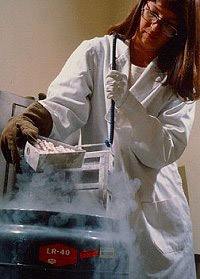 |
 |
 |
 Health & Beauty | March 2005 Health & Beauty | March 2005  
Experimental Therapies Aid Some Cancer Patients
 Delthia Ricks - Newsday.com Delthia Ricks - Newsday.com


| Freezing and thawing ovarian tissue has resulted in a viable human embryo for the first time.
(Photo: U.S. Natl Genetics Resource Program)

|
Despite the common notion that people with advanced cancer are not aided by experimental therapies, a new analysis of cancer clinical trials shows a major benefit for some.

Often patients with advanced cancers run the treatment gamut before enrolling in a clinical trial. A statistical study two years ago suggested no benefits from investigational therapy. Some ethicists had mulled whether such therapies merely offered false hope.

But researchers from the National Institutes of Health and cancer centers nationwide have found that some patients fared well in what is known as a Phase I clinical study. Phase I is the Food and Drug Administration's designation of the first step in research of a new medication or drug combination.

"There has been this general worry that Phase I oncology trials have a very low prospect of benefit for patients," said Christine Grady, who heads human-subject research in the department of clinical bioethics at the NIH. "But the data we put together show that the outcome is better than what people have been quoting in the past."

Grady underscored that patients fared well in studies involving several drug types and categories. The 460 trials studied examined a wide range, from old drugs in new combinations to novel agents never before tested in humans. "Phase I oncology trials are very diverse studies; some involve drug combinations," she said. "They are not all single-agent trials. That's the misconception." Grady's study appears in today's New England Journal of Medicine.

She and her colleagues examined nearly 12,000 adults who enrolled in cancer clinical trials between 1991 and 2002. About 11 percent experienced some benefit while 27 percent more had relatively strong responses to the medications. These are encouraging percentages for a group with essentially no other medical options.

The review examined a variety of drug types and classes, including cancer vaccines, new combinations of existing drugs and new single agent therapies, such as angiogenesis inhibitors.

Dr. Robert Morgan, who heads the neuro-oncology division at the City of Hope National Medical Center in Duarte, Calif., said the findings reiterate what oncologists have said all along: there can be benefits to taking research drugs.

Morgan said while there is often a placebo effect that improves quality of life, there are medical effects as well. Grady's research shows tumor stabilization, a documented measure indicating the therapies work.

"Previous reports regarding the efficacy of treatments for patients treated in Phase I trials had ranged from 4 to 6 percent," Morgan said, which had led some doctors to discourage patients from enrolling in a trial. The new study strongly suggests, he said, that some patients experienced better responses with investigational medications than they did with standard therapy. | 
 | |
 |



